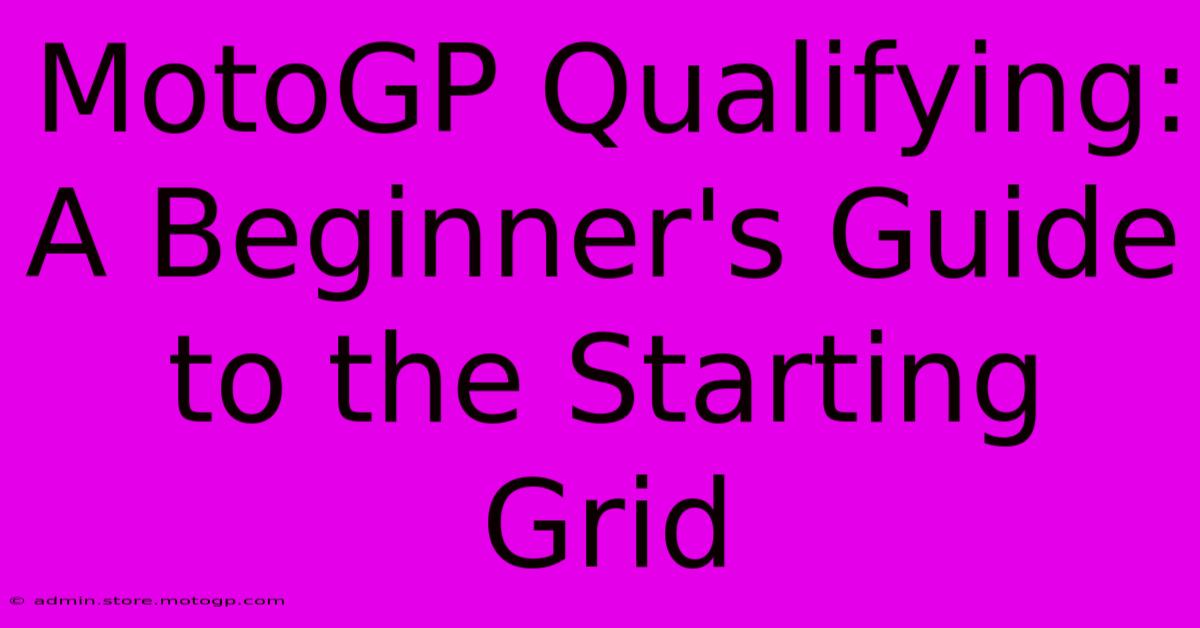MotoGP Qualifying: A Beginner's Guide To The Starting Grid

Table of Contents
MotoGP Qualifying: A Beginner's Guide to the Starting Grid
MotoGP racing is thrilling, but understanding how the starting grid is formed can add another layer of excitement. This beginner's guide breaks down the qualifying process, explaining how riders earn their positions for the race. Knowing the ins and outs of MotoGP qualifying will enhance your viewing experience and deepen your appreciation for the sport.
Understanding the Qualifying Format
The MotoGP qualifying format isn't overly complex, but it's crucial to understand the different sessions and their impact on the final grid. The process typically involves three sessions:
1. Free Practice (FP1 & FP2): Laying the Foundation
The weekend kicks off with two free practice sessions (FP1 and FP2). These sessions are crucial for teams to gather data, test different setup configurations, and get a feel for the track. While these sessions don't directly determine grid positions, they're essential for preparing for qualifying. Riders use this time to improve their lap times and identify areas for improvement. Data collected here heavily influences the team's approach to qualifying.
2. Qualifying 1 (Q1): The Fight for Q2
Qualifying 1 is a 15-minute session for the slower riders. The ten riders with the slowest combined times from the two free practice sessions participate in Q1. Only the two fastest riders from Q1 advance to Qualifying 2. This means the pressure is intense; every tenth of a second counts. These riders are fighting for a spot amongst the top contenders. Mistakes here can be costly, pushing a rider further down the grid.
3. Qualifying 2 (Q2): The Battle for Pole Position
Qualifying 2 is where the real fireworks begin. The top ten riders from the combined free practice sessions automatically qualify for Q2, joining the two fastest riders from Q1. This 15-minute session is a high-stakes battle for pole position – the coveted first place on the starting grid. The rider with the fastest lap time secures pole position, followed by the rest of the Q2 participants in order of their fastest lap times. This session is usually packed with nail-biting close calls and stunning overtakes as riders push their machines and themselves to the absolute limit.
The Importance of Starting Position
The starting grid plays a significant role in the race outcome. A strong start from pole position or a top-row position is highly advantageous. It allows riders to control the race's early stages, leading the pack into the first corner and setting the pace. However, while starting at the front is beneficial, skillful riders can overcome a less favorable starting position with smart racing strategies and overtaking maneuvers.
Factors Affecting Qualifying Performance
Several factors contribute to a rider's success in qualifying:
- Rider Skill: This is the most obvious factor. A skilled rider can extract maximum performance from the motorcycle, regardless of the machine.
- Motorcycle Setup: Teams spend countless hours refining the motorcycle's setup to optimize performance for a specific track. A well-tuned machine is crucial for achieving fast lap times.
- Track Conditions: Weather plays a significant role. Track temperature, humidity, and even wind can impact performance, making adapting to the conditions vital for success.
- Tire Choice: Choosing the right tires is crucial. Teams must carefully select tires based on expected track conditions and temperatures to get the maximum grip.
Conclusion: More Than Just a Warm-up
MotoGP qualifying isn't simply a warm-up for the race; it's a high-stakes competition in itself, determining the starting grid and setting the tone for the upcoming race. Understanding the qualifying process gives fans a deeper appreciation for the skill, strategy, and intensity of MotoGP racing. So next time you watch a MotoGP race, remember the journey each rider took to earn their starting spot – it's a crucial element of the entire weekend's drama!

Thank you for visiting our website wich cover about MotoGP Qualifying: A Beginner's Guide To The Starting Grid. We hope the information provided has been useful to you. Feel free to contact us if you have any questions or need further assistance. See you next time and dont miss to bookmark.
Featured Posts
-
Ex Factory Race Bikes Built To Dominate
Feb 19, 2025
-
Moto2 Bikes The Ultimate Racing Machines
Feb 19, 2025
-
Formula 1 Shuttle The Gold Standard
Feb 19, 2025
-
Moto 2 Bike Specs The Riders Edge
Feb 19, 2025
-
Moto Gp Arcade Game Experience The Thrill Of Victory
Feb 19, 2025
